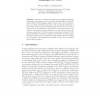205 search results - page 4 / 41 » Testing the Equivalence of Regular Languages |
FCT
2007
Springer
15 years 8 months ago
2007
Springer
Abstract. Motivated by considerations in XML theory and model checking, data strings have been introduced as an extension of finite alphabet strings which carry, at each position,...
73
Voted
CALCO
2005
Springer
15 years 7 months ago
2005
Springer
In the specific situation of formal reasoning concerned with “regular expression equivalence” we address instances of more general questions such as: how can coinductive argum...
DBPL
2007
Springer
15 years 8 months ago
2007
Springer
Martens et al. defined a pattern-based specification language equivalent in expressive power to the widely adopted XML Schema definitions (XSDs). This language consists of rules...
FSTTCS
2009
Springer
15 years 8 months ago
2009
Springer
Recently, Mikołaj Boja´nczyk introduced a class of max-regular languages, an extension of regular languages of infinite words preserving many of its usual properties. This new c...
124
click to vote
ICGI
2010
Springer
15 years 2 months ago
2010
Springer
In this work, we give an algorithm that infers Regular Trace Languages. Trace languages can be seen as regular languages that are closed under a partial commutation relation called...

